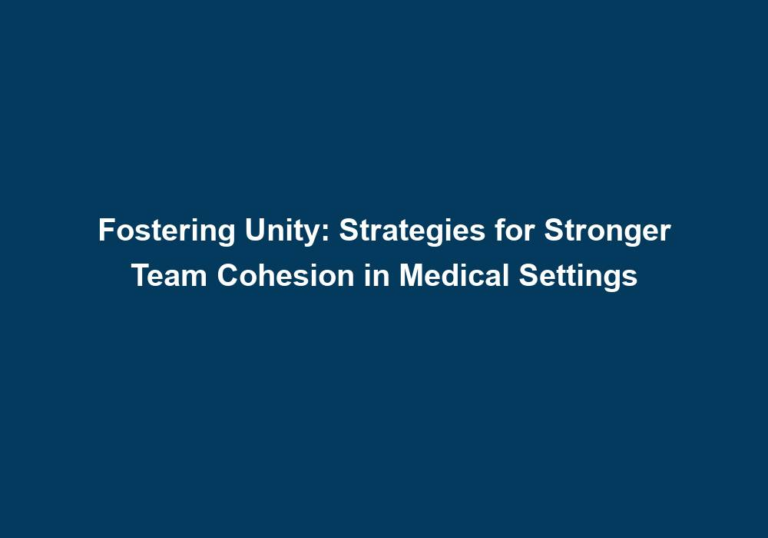Collaborative Care: Mastering Interdisciplinary Teamwork through Workshops
In the ever-evolving landscape of healthcare, the importance of collaborative care and interdisciplinary teamwork cannot be overstated. The ability of healthcare professionals from various disciplines to work together seamlessly is crucial in providing high-quality patient care and achieving positive health outcomes. To foster and enhance these essential skills, workshops focused on collaborative care have become an increasingly popular and effective method.
The Power of Collaborative Care
Collaborative care involves healthcare professionals from different disciplines working together to develop and implement comprehensive care plans for patients. By leveraging the unique expertise and perspectives of each team member, collaborative care can lead to improved patient outcomes, increased patient satisfaction, and enhanced overall healthcare delivery.
Benefits of Collaborative Care:
- Improved Patient Outcomes:
Collaborative care significantly improves the quality of patient care by pooling the knowledge and expertise of healthcare professionals from various disciplines. Through this interdisciplinary approach, more comprehensive treatment strategies tailored to the individual needs of patients can be developed. By considering multiple perspectives, collaborative care often leads to better diagnosis, timely interventions, and more effective care plans, resulting in improved patient outcomes.
- Enhanced Patient Satisfaction:
Collaborative care emphasizes a patient-centered approach, ensuring that patients are active participants in their own care. When healthcare professionals work together, patients feel more engaged and empowered, leading to increased satisfaction with their healthcare experience. By involving patients in shared decision-making and care planning, collaborative care promotes a sense of ownership and improves patient satisfaction.
- Increased Efficiency:
Interdisciplinary teamwork minimizes redundant efforts and enhances efficiency in healthcare delivery. By streamlining communication and coordination among team members, collaborative care reduces the chances of errors, delays, and unnecessary expenses. Through effective collaboration, healthcare professionals can optimize resource allocation, reduce duplication of services, and improve overall healthcare system efficiency.
- Holistic Approach:
Healthcare professionals from different disciplines bring unique perspectives to the table, enabling a more comprehensive understanding of patients’ medical, psychological, and social needs. This holistic approach allows for better assessment and management of complex medical conditions. By considering the broader context of a patient’s health and well-being, collaborative care can address not only the physical aspects but also the emotional and social factors that contribute to overall health.
The Role of Workshops in Mastering Interdisciplinary Teamwork
Workshops focused on collaborative care play a vital role in equipping healthcare professionals with the necessary skills to effectively work as a team. These workshops provide an interactive and hands-on learning environment where participants can develop and refine their abilities to collaborate, communicate, and problem-solve within an interdisciplinary setting.
Key Components of Collaborative Care Workshops:
- Communication Skills:
Effective communication is the foundation of successful interdisciplinary teamwork. Collaborative care workshops emphasize the importance of clear and concise communication, active listening, and respectful dialogue. Participants learn strategies for effective information sharing, including handovers, case conferences, and multidisciplinary meetings. Through role-playing exercises and group discussions, healthcare professionals can enhance their communication skills and learn to navigate the challenges of interdisciplinary collaboration.
- Team Dynamics:
Understanding team dynamics is essential for fostering a collaborative and supportive environment. Collaborative care workshops focus on building trust, promoting open communication, and developing shared goals and responsibilities. Participants learn how to navigate conflicts, leverage diversity, and foster a positive team culture. By exploring different team roles and dynamics, healthcare professionals can develop the skills needed to work effectively as part of an interdisciplinary team.
- Interprofessional Education:
Collaborative care workshops provide an opportunity for healthcare professionals to learn about the roles, responsibilities, and expertise of other disciplines. By gaining a deeper understanding of each other’s perspectives, participants can enhance their collaborative efforts and promote a patient-centered approach. Workshops may include presentations from experts in various fields, panel discussions, and case studies that encourage interdisciplinary learning and collaboration.
- Problem-Solving and Decision-Making:
Collaborative care often involves complex patient cases that require interdisciplinary problem-solving. Workshops provide participants with tools and techniques to critically analyze problems, make evidence-based decisions, and develop innovative solutions. These skills are vital in ensuring optimal patient care and effective teamwork. Through interactive exercises and case studies, healthcare professionals can enhance their problem-solving and decision-making abilities within an interdisciplinary context.
Making the Most of Collaborative Care Workshops:
- Active Participation:
To maximize the benefits of collaborative care workshops, active participation is crucial. Participants should engage in group discussions, ask questions, and share their own experiences and insights. Active involvement promotes a deeper understanding of the concepts and allows for a more meaningful learning experience. By actively participating, healthcare professionals can apply the knowledge gained in real-world scenarios and enhance their collaborative skills.
- Networking Opportunities:
Collaborative care workshops bring together healthcare professionals from various disciplines and institutions. Take advantage of these networking opportunities to expand professional connections, share best practices, and establish ongoing collaborative relationships beyond the workshop setting. By building a network of interdisciplinary colleagues, healthcare professionals can continue to learn from each other and collaborate on future patient care initiatives.
- Continued Learning:
Collaborative care is an ongoing process that requires continuous learning and skill development. After attending a workshop, participants should seek opportunities to apply and reinforce the knowledge gained. This can be achieved through case-based discussions, professional development activities, and ongoing interdisciplinary collaboration. By actively seeking out opportunities for continued learning, healthcare professionals can stay at the forefront of collaborative care practices and continually improve patient outcomes.
Conclusion
Collaborative care is a cornerstone of modern healthcare, improving patient outcomes, enhancing patient satisfaction, and promoting efficient healthcare delivery. Workshops focused on mastering interdisciplinary teamwork provide healthcare professionals with the necessary skills to effectively collaborate, communicate, and problem-solve within an interdisciplinary setting. By actively participating, making use of networking opportunities, and continuing to learn and apply the concepts taught in workshops, healthcare professionals can transform their practice and deliver superior patient care.







